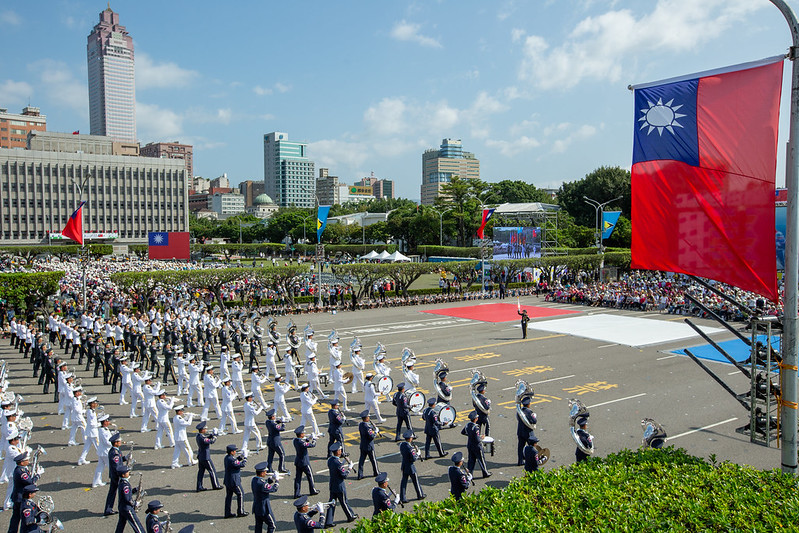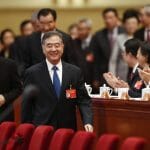Taiwanese dissatisfied with cross-Strait relations and diplomacy gave the Kaohsiung mayor and prospective KMT presidential candidate higher evaluations, while defense and livelihood issues did not have the same statistical or substantive influence.
Han Kuo-yu surprised many observers with his victory in the Kaohsiung mayoral race in November, the clearest example last year of a Kuomintang (KMT) candidate faring above expectations in a south historically dominated by the Democratic Progressive Party (DPP). This “Han wave” now appears to have propelled Han as a viable presidential candidate for the January 2020 elections, one in which most polls, whether a two-way race with incumbent Tsai Ing-wen, or three-way race including independent Taipei Mayor Ko Wen-je, show Han as a strong contender.
Some attribute Han’s success to personality traits, mostly focusing on his perceived straightforward campaign style compared to other KMT candidates, although opponents often decry that lack of specificity or substance in his speeches. Rather than just attribute Han’s rise to personality, party identification or demographics, I wanted to see to what extent perceptions of specific policy areas influenced views of Han. For example, Han’s emphasis in the mayoral election on economic hardships, his claims of campaigning on “one hundred percent economy, zero percent politics” and that “Kaohsiung will become rich,” and his more recent talk about a free economic zone (FEZ) around Kaohsiung, would logically all seem to be targeting voters who were dissatisfied with economic policy under Tsai. Likewise, his support for the so-called “1992 consensus” suggests a return to a cross-Strait environment akin to that under that last KMT president, Ma Ying-jeou, although recent Hong Kong protests likely factored into Han’s decision to limit overtures to China, stating for example his opposition to the “one country, two systems” formula’s application to Taiwan.
Taiwan’s Election and Democratization Study (TEDS) at National Chengchi University (NCCU) this month released survey data from March that provides some insight into the extent in which policy preferences influences views of Han. The TEDSsurvey includes a question on likability of politicians on a 0-10 scale, ranging from “very disliked” (0) to “very liked” (10). Besides Han, TEDS asked about Eric Chu, Wang Jin-pyng, William Lai and Ko Wen-je, but did not include Terry Gou, another KMT candidate for the race. The figure below shows the percentage of respondents giving a favorable likability score (6 or higher). Here we see Han’s favorability is marginally different from Ko’s overall. However, among KMT supporters, Han’s likability nearly hits 90 percent, higher than Lai’s among DPP supporters.

Favorability tells us little about policy. For this, we can turn to other questions in the survey. The survey asks respondents to evaluate President Tsai Ing-wen on five measures: cross-Strait relations, diplomacy, national defense, promoting economic development, and handling livelihood issues. The figure below highlights major differences between the two major parties in satisfaction levels on each of these issues. For simplicity, I condensed a four-point measure to a binary measure of “not satisfied” versus “satisfied.” The results show stark differences in perceptions between the two parties, where KMT supporters registered satisfaction rates a fraction of that of DPP supporters. For two areas — cross-Strait relations and economic development — satisfaction rates among DPP supporters was over 13 times the satisfaction rate of KMT supporters. If we compare the five policy measures among those who stated they supported the KMT versus those who have Han a favorable rating (6-10), these likely Han supporters registered satisfaction rates two to three times that of the KMT, yet still far lower than DPP supporters. Such a discrepancy can be accounted for by the fact that only 48.1 percent of those rating Han a 6 or higher identified themselves as a KMT supporter, with 31.8 percent comprised of those claiming no party identification, and 9.6 percent comprised of DPP supporters.

Regression analysis on evaluations of Han provides additional insight as it allows us to parse out the separate influences of partisan support, demographic variables, views on the unification versus independence issue, and dissatisfaction with the five policy areas mentioned above. As expected, KMT supporters rated him higher than DPP supporters, and those who prefer independence scored him lower. However, none of the basic demographic variables — age, gender, or education — were statistically significant. Regarding the five policy measures, we see the strongest influences on positive evaluations of Han were being dissatisfied with cross-Strait relations, followed by diplomacy and economics. In other words, Taiwanese dissatisfied on these issues, especially cross-Strait relations and diplomacy, gave Han higher evaluations, while defense and livelihood issues did not have the same statistical or substantive influence.
One might first think such patterns are just picking up dissatisfaction in general for Tsai or latent support for the KMT among those that did not state they supported the party. To address this, I also ran the same models for evaluations Eric Chu and Wang Jin-pyng. The same patterns do not emerge for Han’s KMT colleagues: only dissatisfaction with cross-Strait relations influenced public evaluations of Chu, while none of the five measures influenced evaluations of Wang. Also just limiting the analysis to self-professed independents finds that policy dissatisfaction on cross-Strait relations, diplomacy, and economics still corresponds with support for Han, but none of the five issues corresponds with higher evaluations for other KMT politicians.
Admittedly, a survey conducted in March, prior to either party formally deciding on their candidate for next year’s presidential election, gives an incomplete picture, and the results also fail to take into account recent unrest in Hong Kong as well as President Tsai’s success in securing the DPP’s nomination last week against Lai. Public opinion can shift over time and most observers suggest Han may have already peaked in popularity. Nor can these findings suggest an easy remedies for Tsai. For example, Tsai’s ability to change public opinion regarding cross-Strait relations is constrained severely by China’s insistence on Taipei’s acknowledgment of the “1992 consensus,” but such acknowledgement would be politically unacceptable to traditional DPP supporters and moderates in the “blue” camp, largely due to Xi Jinping’s insistence that the “1992 consensus” now incorporates the “one country, two systems” framework. Likewise, it is unclear what specifically is motivating the dissatisfaction with diplomacy, as it is unlikely that just the loss of official diplomatic relations — something Tsai has little control over in the face of Chinese incentives — is driving public opinion. Nevertheless, the findings here should help move the discussion about Han’s support toward policy rather than personality traits.
You might also like
More from Taiwan Politics
President Tsai’s Second Term and Cross-Strait Relations: What to Watch Out For
The next four years will be marked by uncertainty over China’s trajectory and the state of the world in the …
Candidate Claims ‘Nobody Loves Taiwan More Than Xi Jinping’
Family business connections in the Pingtan free-trade zone and a son’s involvement with the CPPCC are raising questions about possible …
Above All, The Legitimacy of Taiwan’s Democracy
Since democratization, the main political parties in Taiwan have agreed to rules of the game which have served to legitimize …









